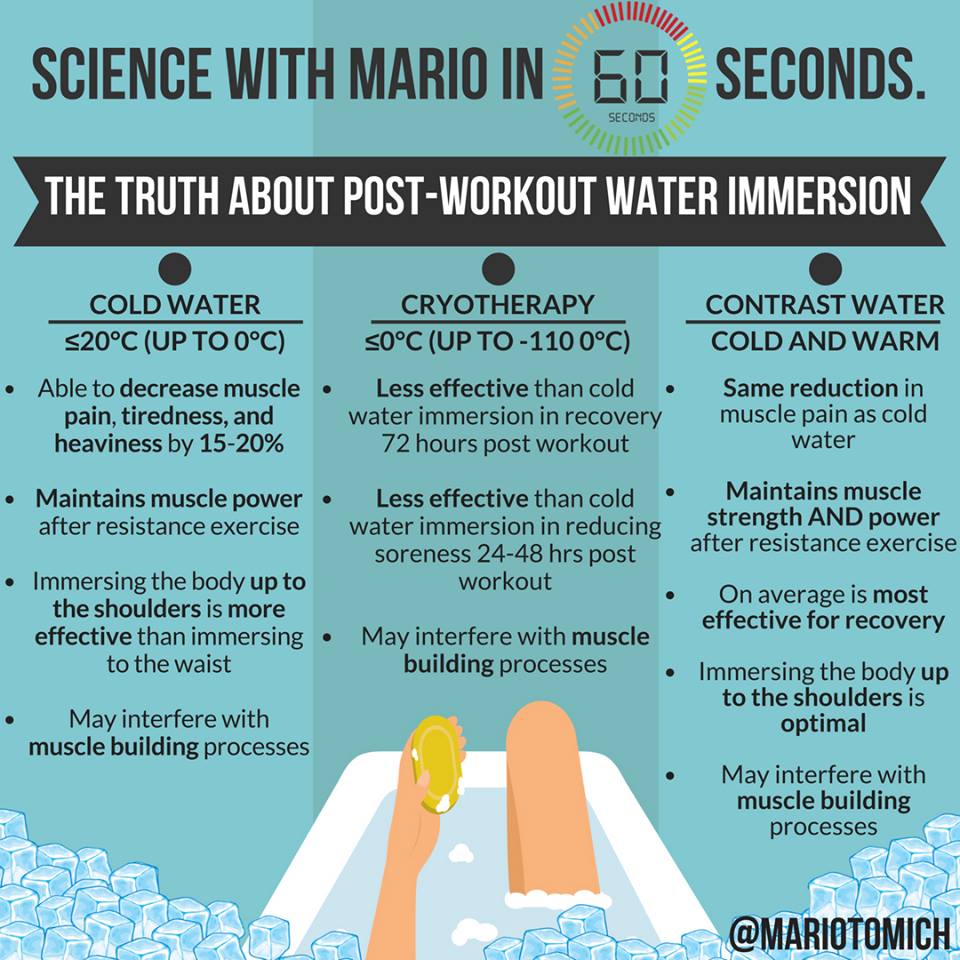Should You Take a Cold Shower After a Workout?
Although most of us are familiar with Wim Hof having a party in ice-cold water, water immersion for recovery is slightly different.
While Wim is aiming for the longest time spent in the ice-cold water, athletes use varying temperatures of water to boost their recovery.
In this short review we compared 3 different types of water immersion methods:
- Cold water immersion
- Cryotherapy
- Contrast showers
The extent to which water immersion helps recovery depends on a lot of factors.
e.g., Which sport you practice, type of water immersion, the duration of the recovery period, and the amount of muscle damage.
Let's look at potential benefits cold water has for strength training.
1) Cold water therapy (e.g., Cold showers)
e.g., Showers or baths with temperatures varying between 10-15°C in intervals of 5-15 minutes.
Cold water therapy has shown some promise in research looking at recovery.
If you're looking to reduce muscle soreness and tiredness, cold water can speed things up to 20%.
Cold water therapy also seems to help with maintaining power. You do have to immerse yourself up to your shoulders.
2) Cryotherapy
This is often done by entering a chamber that is up to -110 °C for no more than 2-3 minutes.
In most experiments, cryotherapy is less effective when compared to cold water.
Cold water immersion looks to be superior both for improving recovery and maintaining power.
3) Contrast water therapy
e.g., Alternating water temperature between 8-15°C cold 1-2 minutes with 38-42°C for a similar time.
Contrast showers appear to show the biggest benefit of all.
Besides speeding up recovery up to 20% (like cold water), it also helps maintain both strength AND power.
Note: All 3 forms of cold water exposure may interfere with muscle building processes. This is something to be aware of if your goal is maximum muscle hypertrophy.
Cold Shower After Training? The Practical implications:
Although these strategies may be less suitable for muscle growth, they can benefit strength athletes.
So if you're new to strength training or you took a long break (i.e., 3 weeks), taking a cold/contrast bath will reduce the initial muscle soreness.
And they will also help you maintain power and to a lesser extent strength.
REFERENCES:
Resistance exercise:
Short time (<4 hrs) cold and contrast water therapy fail to augment recovery defined by a reduction in perceived fatigue and muscle strength/power (MVIC) after resistance training in untrained men: https://www.ncbi.nlm.nih.gov/pubmed/27918654
12 week and 7-day research suggests that in untrained men, cold water therapy potentially hinders the anabolic response by decreased swelling: https://www.ncbi.nlm.nih.gov/pubmed/26174323
WBC sustains improvements in subjective recovery and muscle soreness following metabolic or mechanical overload, but little benefit toward functional recovery: https://www.ncbi.nlm.nih.gov/pubmed/24648779/
These findings indicate that cold water immersion is no more effective than active recovery for reducing inflammation or cellular stress in muscle after a bout of resistance exercise in untrained men: https://www.ncbi.nlm.nih.gov/pubmed/27704555
Power and strength:
CWI was more effective than WBC in accelerating recovery kinetics for countermovement-jump performance at 72 h postexercise. CWI also demonstrated lower soreness and higher perceived recovery levels across 24-48 h postexercise: https://www.ncbi.nlm.nih.gov/pubmed/27396361
Overall, CWI and CWT were found to be effective in reducing the physiological and functional deficits associated with DOMS, including improved recovery of isometric force and dynamic power and a reduction in localized oedema. While HWI was effective in the recovery of isometric force, it was ineffective for recovery of all other markers compared to PAS: https://www.ncbi.nlm.nih.gov/pubmed/17978833
Cryotherapy:
There is insufficient evidence to determine whether whole-body cryotherapy (WBC) reduces self-reported muscle soreness, or improves subjective recovery, after exercise compared with passive rest or no WBC in physically active young adult males. There is no evidence on the use of this intervention in females or elite athletes. https://www.ncbi.nlm.nih.gov/pubmed/26383887
Summary on how cold water and contrast don't improve team sport (aerobic) performance: https://www.ncbi.nlm.nih.gov/pubmed/27398915

